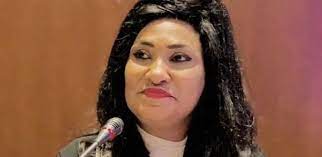APA-Dakar (Senegal) – One of the two women on the list of twenty candidates for the 2024 presidential elections in Senegal, Rose Wardini, has thrown in the towel before a new date for the polls has been set.
The leader of the Sénégal Nouveau movement has officially announced her decision to withdraw her candidacy for the 2024 presidential election. At a press conference in Dakar on Monday evening, the gynaecologist said she had taken the decision “in complete sovereignty and after extensive consultation” with those close to her, including her brother Antoine Wardini, a retired colonel in the Senegalese army, who sat beside her.
Ms. Wardini has been accused of perjury in her declaration of honour and of holding French citizenship when she filed her candidacy with the constitutional court, whereas presidential candidates must be exclusively Senegalese.
Suspicions were heightened after screenshots were published on social media sites showing her name on the French electoral roll.
This followed the validation by the constitutional court of a list of twenty candidates, including her, which caused outrage among activists of the Senegalese Democratic Party (PDS) after their candidate, the exiled Karim Wade, was excluded from the race for the same reasons: his dual Senegalese and French citizenship.
Wardini was summoned and taken into custody by the Criminal Investigation Department (DIC) on 2 April. After being referred to the public prosecutor, she was released four days later and placed under judicial supervision by the presiding judge.
Speaking to journalists, she acknowledged her bona fides and insisted that “the day of truth will soon dawn, the renunciation of this much-criticised nationality.”
She said “all the evidence of the sincerity of my affidavit will be made available to the judge,” adding that she had withdrawn her candidacy for reasons including “the preservation of social peace.”
She also said “peace and the reconciliation of all the children of this country are far above all our ambitions. That is why I have decided to withdraw my candidacy in the hope that this will facilitate the continuation of the electoral process in a climate of peace and that elections can be held before 2 April 2024,” the deadline for the term of President Macky Sall, who is not among the nineteen remaining candidates.
Rose Wardini’s withdrawal leaves businesswoman Anta Babacar Ngom as the only woman in the running for the presidency.
A new date for the polls will be set at the end of consultations initiated by the outgoing head of state.
Karim Wade ruled out
Initially, 93 presidential candidacies were submitted to the constitutional court, which on 12 January validated only 21 of them after an initial sorting process that took into account the validity or otherwise of their sponsorship. Eight days later, on 20 January, the Council published a final list of 20 candidates. Karim Wade, candidate of the Senegalese Democratic Party (PDS) and son of former President Abdoulaye Wade, was rejected on the grounds of dual nationality.
On Saturday 3 February, President Sall took the unprecedented step of revoking the decree convening the electoral council on 25 February. This action triggered a series of events that plunged Senegal into an unprecedented political crisis.
Tensions between the National Assembly and the constitutional court came to a head after the PDS accused two constitutional judges of corruption. These accusations added fuel to an already tense climate.
On 31 January, liberal MPs, supported by part of the majority, succeeded in setting up a parliamentary committee of inquiry. This initiative marked the beginning of a series of complex political manoeuvres that shook the country.
Postponement of the election
On Monday 5 February, a plenary session of the National Assembly was held to discuss the bill to postpone the elections. After an eventful day punctuated by clashes between deputies, the bill was approved. But the decision was not without consequences. Opposition MPs who protested against the vote being taken without debate were forcibly removed from the chamber by gendarmes acting at the behest of the President of the National Assembly.
Barely two days later, as violence erupted in Dakar and other parts of the country, some MPs challenged the law before the Constitutional Council. At the same time, 15 presidential candidates took their case to the Supreme Court.
Three people died in the demonstrations that followed the decision to postpone the presidential election.
Constitutional Court overturns postponement
In a decision on 15 February, the constitutional court overturned the decree of the Senegalese leader and cancelled the postponement of the 25 February election. However, the High Court preferred to leave it to the administration to set a new date, which should not be later than 2 April. President Sall, who has promised to respect this decision, has called for consultations with a view to holding elections as soon as possible. On Monday, some candidates claimed to have received the electoral dossier, while part of the opposition continued to call for a postponement.
ODL/ac/lb/as/APA


